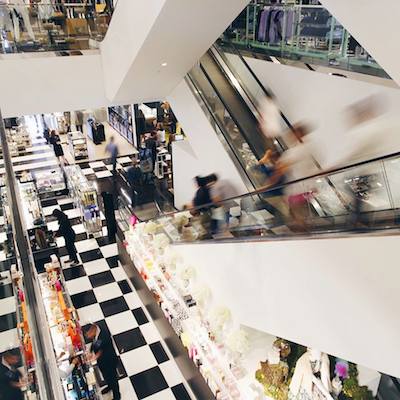Almost half of retail executives expect the U.S. presidential election to have an impact on their business, as promises of protectionist trade policies are heard from both major party candidates.
A new survey conducted by YouGov for GT Nexus found that as November’s polls loom ahead, retailers fear more difficulties, including higher costs for goods and more delays in getting merchandise. Following nationalist movements such as the United Kingdom’s Brexit movement, the U.S. is facing a similar shift away from free trade, creating cause for concern among retailers.
"Some of this stems from a slow economic rebound coming out of the Great Recession," said Bryan Nella, senior director of corporate communications at GT Nexus. "Many around the globe feel the need for change – or that the current way is not working.
"Whether we’re talking about the election or Brexit or any other examples of nationalism, there’s a movement to move past the old, traditional ways of doing things," he said. "This includes political policies. Both candidates appear to be tapping into that sentiment."
Trading views
Historically, the Republican party has been in support of free trade. The party’s candidate Donald Trump has come out against what he considers unfair trade deals, threatening to implement high tariffs on incoming goods.
Democratic nominee Hillary Clinton, who traditionally was in favor of free trade, is showing a new position against deals including the North American Free Trade Agreement and the Trans-Pacific Partnership.
Taking an opposing view to Mrs. Clinton, the U.S. Fashion Industry Association has come out in favor of TPP, supporting what it sees as a possible boon to the industry. While negotiations for the deal with Japan, Mexico, Canada, New Zealand and others have concluded, each individual country must ratify it.
YouGov’s survey of 250 U.S. retail executives found that the candidates' moves toward protectionism are projected to make retail more challenging, according to the 46 percent who worry about tariffs and other measures.

Bloomingdale's Palo Alto store
Thirty-seven percent of respondents say they expect costs to rise as a result of trade policies, while 19 percent say they foresee lower margins. One out of five anticipate having issues or delays when importing.
Out of the sample, 13 percent say that changes to trade will likely hurt their international growth plans.
To counterbalance the expected negative impact on trade, 36 percent of retailers plan to raise prices. Another solution mentioned is getting suppliers to lower their costs, a move favored by 27 percent of respondents.
Other strategies for mitigating the loss from importing include cutting out costs in production or moving production to a more appealing country.
Not all retailers are worried, with 36 percent saying that protectionism would have no impact on their businesses.

Image courtesy of Saks Fifth Avenue
A shift in trade policy could also come with similar challenges within the supply chain. Forty-four percent are concerned about higher costs of goods, while 17 percent worry about being able to get the materials they need.
When faced with higher potential costs to ship, 19 percent would look to move production to the U.S., while 16 percent would relocate their manufacturing to a nearby country or one that is less costly. Six percent would begin to decentralize their production, establishing factories in markets where goods will be sold.
While executives spoke to their hypothetical plans, 68 percent of them have no existing programs in place to adapt to new trade regulations. Additionally, 26 percent do not know if they will implement these strategies in their supply chain.
When looking at possible restructuring of production, 57 percent are unaware of the portion of goods that can be relocated.
Retailers may not have concrete plans in place, but they do recognize technology’s likely role in adapting. Around a quarter expect digital channels to assist with communication with trade partners, assessing costs and organizing their inventory.
"Agility and flexibility is a good place to start in the move towards guarding against potential changes to trade laws and policy," Mr. Nella said. "Being agile in a sense that they can move the supply chain and production of goods out of harm’s way.
"This is where cloud technology can play a role," he said. "Picture a business network with 25,000 companies across the globe offering various services for global trade and supply chain. The network is connected – like LinkedIn, for example – and everyone is aligned and can make updates, but a single instance of data resides in the middle.
"This gives retailers the ability to see across the network and make changes as conditions shift. A supplier lacks capacity to fill orders next week? Shift materials to another factory.
"A natural disaster shuts off production in Singapore for multiple days? Identify priority customer orders at-risk and expedite goods from another region in the network. A 25 percent tariff is being placed on Chinese goods? Shift production to my supply chain in Vietnam or Bangladesh."
Economic election
The election year is already curbing U.S. spending.
Bain's luxury goods projections for 2016 anticipated that consumers would hold off on high-end purchases until the election was over. Bain and report partner Altagamma found that in the Americas, luxury growth decreased by 2 percent at current exchange rates (see story).
Beyond retail, this election season is likely to impact pricing.
Home values will end 2016 up 4 percent year-over-year, according to realty experts participating in Zillow’s Home Price Expectations Survey.
The 4 percent number is slightly higher than the 3.7 percent that was predicted at the survey’s prior conduction, a result of a more stabilized U.S. stock market and rebounding oil prices, among other factors. Further into the future, however, the U.S. president could play a large role in shaping the housing market’s future.
Forty-five percent said that a Trump presidency would necessitate adjusting expectations either “very negatively” or “somewhat negatively,” compared to just 16 percent who expressed positivity. With Ms. Clinton, the numbers are almost reversed, with 16 percent predicting a negative impact and one-third expressing positive expectations (see story).
"We live in a world where consumers are demanding," Mr. Nella said. "Retailers are challenged to meet excessive demand with regards to product, quality and delivery. And it’s difficult to pass along higher costs to consumers in the current environment.
"These will be challenges to contend with if the shift away from free trade continues in the future."
{"ct":"S6WfKGOEhlkgrQ\/Sr8Xb\/axTZVOmR9dw4zvFKea6PIXk9xlQcms6Q11VQ0e0P3iKZ3OuBm3+Dyy9X0u5u0KuImow\/shbQqMXxkhNDYMmGQt9EulDS50d4SSwo+pUsoLSYyBcrzToG0isI6CPyxqa1c2zVcTytTsPRoHFhnNILYWhAUBbk1QfyieY0oSasD8sGIar5UXSkztq5BW5z81bVRzfDQ1+R8Th0OpF8rUmdRSuFBaG1JJI4P0z7JRpcXpZu2qd0q\/DqYAh9kghgEslxahNba7rYg5W+MWoMbvj4RdiAHvgtj0+8jrjbD+ncm3302XsIat0cFyA4j3YEnMLUBA2pB4TlyUi9WKd\/dyPAuqw5lZ3ug\/pnoQZmj3bDTpB5enqUvpYeaw5ho6\/uwQnSWSqlFFbQL8rLSKf7dsrLX5Ove3\/aw9ATHSwexkPdM414O3aV5+za3K2YUIE8XzaY3sFt9rdGee6URJop6MKjmDoH1Mdi22iHeW4rWknm7c9V8mnESdLs+t9SK9z\/YeiMJBm9RBwF2CyOF1x9jfocxbej1VNM+YjF6ra0Jk1WvI8gHnq9P1D\/Cj6TQH37BrnpHj3sYIp0jKg7XvlXirgUWRFXov1NSC9BtbYRAMiuNXnMjwOJgjD7jFuOj6OMtgYYTKWZvehMmmIXt8sQXzzl7TSkg3OMuBmdIoMg09JJmTttBcEXxTw8yppPf5nlK1jZ0Y6PJzL\/k1g37RhcpEImfYc6jUYk7hInVPHgVyYb9rGVS5yDSiSc\/PMhf1kZ2Pwtuf+ZTXR6wVeG9DrKPDwv6wT8HLRwXi05maGrztAxB5aGRIzl9VrR80ATtszNzKjkxL+KWpUaUL6XVAKglSE47I5H6qE4CPtEyfBhS08AgFPQkeRgp72NGVBVVTvLCOV+dhMRgdRMkK+m2M4LddBn1amB5U3zJBKSZsnejEBqcY+2x7smxVD51FfwRo7NcLnysnZCzjkSJiZNK\/z3sxFQZMFEr9E76yxx+atJpBXSWP3Y7EYHiTCXnfEJM+D34th7bWErQkJ8Q6UW5UYGJoA+aTqLcgtrAMagacGIKl3dbWRIBxyIJfgp1hZHVVDzoL437hxrahEivB11JmuIvjFHhK3N8NfcOV+\/bbCDDwWpyGjiafF6WeEaqenjJsV2\/pmPdXY1bjfJe9pti\/ZD+MsFolW\/bvcm1sMiQP1dsTMoYML5G0l7tOmoP6IUSX1tQP1fiz9jmxrEH\/53Fwug6o\/k\/LSkpiR7hfYu4sO8Xc3UTX7DuFIc7SVeonn\/btZBd7ZZSHZHNIGvvoUDAHzDAiFi6FZKVyP\/EijfcOfUYOFr1E8BI7\/KXH9OvSCXeGzwF\/yzqfjllP71kHvqyRGO34E\/s5Ylb8iSF3\/9oVAEhdnK+CAxxF2f8\/5YRsJ5rPC0Psc55sxCdEeczN8z8\/V+20qfmu2oj7WIATKs1BO1j89uPYGgyTuHrzgZB0oA6M1we+GyEsDytmCPvFqp0MsrjZ3v6SCCsrJLYSWcbtJ4Vo4DmDEMVJoOLbiUr+wD2uLJuLyFPxIwezhs3Atl5s2oi3HxkM8bFJZUUzFD5i6t4UEBbEWq0CostfmnrCg56SKM1Ww88DdoJiG4og3ZBUyZYALIif4TvimTG3cNLvHyzZ1Nn8IMcL3WwfNJIeDr0pGi7Pnqj\/8uQzrYSN1cZt0sS2DNjddMsrx5sagLv3XN\/6WztG9Q+BnnbUj6bYhjfjfVSxkDtt+5Ecbb9jAx8BsScaOHSB1lVEygSW\/M+Qp5cGnpMtJc4HbmDb6ib\/+Sy3NhovqJhieIWCrAlqmIbqGIgvgrNHxwMlUvBdhCAwy6VbnOIlUShskufyGosk3LKFK2D6dRSbG6cGPdsEWM0KIkwvWIvGnAhpPrSkHI4mMS53lw+b3HXlXZgqjBVjkA1BO6vRlKl3pDWzYo4TrrVBjXalbelB7lqyctz9Y8m5Nhf9eId\/\/zACBmDtI5Hu2OZ\/JY3jnRDkllo46qyHa\/fbzgylM4tiiYLHglK2lgCZrR0hvxJbVH4YCoyd6u7kNZxnWk8EvQMk2mX+CLKrHe8eIp50Oub1gTTv\/T9RinsRcmaIw6E73EYZTsz\/gwkWEadxhjuvmboAb0HoonCwrhbwRAfhGQGk75SW9Q+L+DjERNmhmAchif1YnhR3bGOPsWkaJpzr3u9vJG17zAO2U1zGTErg9EKXqcHySm034jPyo5ennRIw+kBP5XyMlJxSWLxFKnsUroLUmSuwceclb18u2RcVk3TqTzhbVfQ2OSfeD4EICDmFRawIhFKyBIT47v8EaCD1pYHCsdunK8m4oirj1xDKZEHZHPLD0PDFHEkKfKV9r\/xmXMU9FY9kEJ+Dol+QEzdWMLlnakJCzUpY+qbNZU\/QM5pG8BWgBAg4fswQwyg+WvLRBVY4q66UPZ7YYVoVKTnnBdPJZ8qbtBb2gKPSbDXmWqvZkW8BM3jfIM0Oy6is3AitJgc3Q5x+L5umWJ08lNPfI+cyGl+N\/8z9F8mAmZPrEYD2Y30rse5X39UDfPHpnwqa2NUDq5CbXLCgD7qQDNjckyyhcK5SlTd1YJQCxygQR+oEDdKnIC3+nhnnVQTiEGeDe9I9PrZHIDYAVziUK7dgH4RxcWSTmKJVurGLkRFNDHjbVNUBG4abdDCT05ocQxF9A0S1gVD6vvcX1SumQd63w9b4HHmUNOtxS526ImkS118kCurrjHy6SZJkXDDer7l6+sBcvzKTlXnf\/LSu9Sjwe09JGG98FVa6fNKi5pAOTJVfnhHnlO7DhvKMMGAuYaUYH2Rs86pMA+hrBJ4FL3MSgHFkKbDlmFNgGCG8N1zyuiiH84qKoxE1OUcvZ\/rM9nEJsgVM5CZaZTa1GSM6dqKlR+jTDWJLua74XSdJ7fuT9Nn4L2Df5On37FFFJWjFRoYrhxG6WlYZPb7FCx1kXJmiuqoUYLGu4Bu9bplzvcb226xx81+mJchYDUb3PLtpwhH5qwqIGxAHkXP\/CN6sAWGVw5RjjT0vphbS\/HETdPajSPNhFr\/wDCeivwAYoe8Y8FhOccENI2DLT+8qqUaBz4G3MnHNVXA7dQ19\/kBfTDrSulECDBkGGQ2U1\/R7\/ajxcUZ6bApRat4N3\/aMkbpnnoyXmlcEIh9SgXKuyzYL4fILvHXQr27odAfefGw28gy6vKU4VbFtIuWvzhu7cEXV2nhS2q2OYoyWV0nHNwOX43zyOHT2hC03sJFE1sxaagrFvfFg5ucMvm2YR7UaA6b88sEgomYWqcMXgEaE4o+ZCC1jnQm\/NAEE5VoP5+f2aItw0b8atCLGqurrt0BbB5\/tifZ0K\/6b+2KnDVKHbbzdtHwDSv8usywmKlpBXyMgVWZa3Ft19RC8Ux6r1QYlp0B0UpdwuEKNxfiobm2eB3vsc7ppeN3RzKlWDFF5m\/iLPQQ8k6Q5rHHXNJCWKTIn0z0PuFBCeYINgjLhU5CKdL2CeZyguFgkChMXrf7zuck8J94hArqAy7HPVplWz9HBTopVWwZq+Oe5rzrtFJWE7j5kwXppBKNtUGVCkjJce1LZ\/qerx0SLcPhKQzIKP8Qe8OVYqK5QXEGx5XCkhKAFe2avfmHewyVjIDumkn\/wIAXEJWTyOI6QwZLSC6mhdI\/E9BF7beiUYxWf84b1yaVKek8s3ADnPg5RzbI2cBZ7rvjm5TzVTYuC1rPW+abIOVZ\/vSdoxfcelabByZQcgG3f8OQVn3gMkaPy5zuChNFGCOcwqxZZsjX0VcP4V3KxucJ4mHO8zJbC472smB1M7HhW6YZQbsOrwM0fk8KlRDVqq2v8ip3oaYL65GfvzLq3dbAWDgQa+uiBwo9nw0QlZhObyTWNMC9au9aMzZ91BUwWOo1NzhL7Prs+QdI6Jppqs0M0c1fBGoYsz8nK85gEQL1RgMLnSlb0p+9\/pNa6FcpLj\/0x+I2U1TxcxnTwHXgxeGt3mvd0akwUy2OIMYHgMM98GPLwTWd7urdHsrzN6qIy1oU5cgyv1Zwf8oLzRJf0keCrnHMRUg5mxFE2aFwdt5uicWxAEnqflBBCZD5OnaQ2pc0qJQQ4m8Sd1jv6ls9FXf4SGqdlvkL12B4hFsdO+eBHZJxMTbARDJVMBXNI4blX8fcqf\/nuTP1dKhGC54NW0otgT1lPNlTiz\/QqjLOIPXjQafSgcuB8flQfrFLnOBaprmV5Tu++lwhnGdYJJPURYYOSwgUIPVXACCyeH0zhRcf34OTwNh994eJltNn3\/ifyFkEwcVYQgqLO8TYE1IViHRchka3YhNJ+wzdxC+TeIPdw8uJEy+0CmeIB9MxJjDb5yYDrjlVCnYAqLzJWW36Ju0Dw3KHH8W7\/v4LDK1LT3fIwgmZ0uBxzN2pYEvzJ60po8+mSnLBEeORCqrMSNCxwRgL34fiymuO8ZCDUOdY0c3xyVoeYlli1bt0n7CrOYCX8mvvj5VhLIBQs5UmCzNxqEcR9ItWKAffhzI7NoOdSaVplR10mNHOS2Xu1ugTShxdhboJToxV5TuZMWgfQlo8y6NEirPwmYHdrb1THaegAZdUz+s93A84I+85gqKAqKAux9+iX2hz1m7vfrdY4WgGjfrgIHU9705mu3et+RKcjb7Kyn3RW2SrTDqSpON3pMmh4P2yQgvwjjQQ9wmtMZbuKPxyEh8sLDl3jffiKzkWd7T0SJgXNJcoNWv7PB\/ZXcOex3yXJacue0kyaIFAug6KvDJfbihp3DJSEuz0JgTzlPgr4st2ZgB8OcBn\/hEGQaJChsprrADxenJnkt\/FCL5OWyo2N\/sPSekIZBRnb54KRXwZKux3WtGhkpASRhOkaTqhnZw0mjZYIMVSHToAroW5oxgfxqy5eQOmF\/Yibhgusd6ZIvNNhzZozLahcw6D5V2sfrNTkoCDXT6sNmLhHWAe9TIv1bac99i5JTRWOMgBrqmNT6sdAHwXdx1oLmHQRD+O6QTDSvEK2rRE0S4MhIv77SlbZqyaJHq1obr3Ru87PDxmcof6cdKe9ZytYZrlZLaAcwr0Tw3kmys81Ll02qndo5Pgvqg3esGkycYn2FAXhIOiFwy3xlw4u+0GHIUk9o\/3jjdGOjwWzIQReRGMAXJ\/1soyTH5LHO+TaEbbrSWR7+l+VPLiVrRry7oxbyVFCS447sF2tmH63fcR2AX9ckar5KXWAvWRhpUcNGxsoFpuZdadDsy9\/+nYCSoVcblZqwi+I1\/vxTQgVeZF+MSRMJuIvYGE0qgqqeLpsZFoxYBDrJEDayXhpt81UatgBCxOvmtE3DTKPHPlvZlTk2cZt+2F1gjECkjutR\/30G6oTk9tL6V\/l1Waz73SaJv9EzYu2nowLPcBGgSN73hi7ft\/yqBR2raY11QaZjXdyD6kLqodxJbc3PKQ63INJ\/2MwtF1yJ73TAsANsKWueRmFhjBP\/+HZzXPItEiQ1k1PDOowKWgWfhGDsh+5dB5BMzLMHTlGLsKAIUvUPXEQDOJbPNHlxLANEjIWdoj6RRdqPmJI\/nKzYWggbjQPUEbTIfQPCx8bM4g3Qch7z+br9CYrdFDVedAchdRf6kSg5IVI\/+d3SUEM3kPj7h5gAeQTvJhxB3dXkJhaWKo9L6kHOQwgRqHtLjPe4Es+X5GH09XXmjE9enxVEeH6cujEDUMqP\/trgDavLxjqOeP7pj\/doajodQZQDE\/wVHDo7tjB4JwZI0aQnJXUakLGg9PPS+K0MCv\/GF5TbN1H3ojxfZhyYhyHCt20pU5UBHQdNcJkNJpzEgHZuC0ZZH5HZwm\/CaAXa+Rfhn7PVv4bgnvpvsC+fKG+cNbeQtzRM2JERxadMgZjZVhQLjO7SD5\/EoUpCiQ76ryy95ChsnkJPcsaT2VzeE0yZSyrksYNY7pEbaFYZDod67Of\/Hg\/URS+1L9zk0OxTznoH3Rjfn7mnQwtbPmrIgXt48XiNhbwIEj2AgiBAR3e5MVxmizXPhDNPHddR5u8UHtHlWahkS5494Y\/xiYuGGJjsoX9L+4\/Fzj8YZFQEU1HUvalYCjJESmmM7+OJyY4LERAQyg1TE0rDFJOcrOAU8L5B8UquXNw4KY7OjUr\/ifo4ohqVZCvFDF6LphKzCynYxss7lso3F8xI+h3YmWaDrdVM9hDjNQdCTdecSWdfJLOYNkJv\/OOabHtJVa2eqLBKGm3QmudYapUY9jB64pYCrE66OPBBkBKbwWe5teLRTdUFpTRwiC\/7wa4Fyarn722U9t6HuzETTzFXeXwdzuCFsWHFLoYZuNW\/tv2nYWi9+JmbqyalLg5VO3ZdVH0EF+vnJyZGf4HymsPlOy2pNcJoEOBwSNupramw045kr2DMHy5OHfNrjO1fmCv5aRQXoA9a5e+MSGPYAnhafMyZ1T2HPv2PLkxkYRt\/0VutAM15Ci7Zqs1td0+R\/mwsdkpguTOMiok6Jx1n0zb6+u4G+7cbm2u05GW44IYAnpHvQI1W7aMbvJ+Cdip5TIr1vvWMvAP4XEvQnZsFTdxRhY44i14vYpMBER8EgszHWUkt93ELWu2m\/QEKBILdlzYogWVz9DrowMErejVgr\/ptMudVtdsqrkb+pBBJxX9A3MjZuBHqrDsaOeVtXF4+9w61qkqRKtQoDJ4AjC4LzmzyUT74B7eLrS7JEmLuRNDt+LpOAedB3\/10Ye9P6srPUzy\/QPrunww7yPkB7vKe1Dy2JECHhll10nwupFg8xfLm+Mg6mRmHqhqY7wdM+cT5+GrU7I9+G0mZv2XRLhcYX8af1RAZZm49NADGKdKo+nInUdOcxFmMjlp9cm1v+Gc5DBU+Q4ClgoHr9oY+lNhTfgK7McOjH\/KA6qSnpbmGR6y3woBf20CyA8VwQeFT5Qb4WZnnoH4y\/efKv8kOYj+dHkomYwZ5VyhQm\/N\/XuvIK1TQprRAk9opmV61xuyDqdYqAMfVq0KpYQ591kvkAAAG1l1QfC2SHC8JYGuPVDhdZP9deLExoPTBwNTFuYwCjWy+Xg+LGt2t034tW2z9sDghyba3pMpjB2qifoEBWpvT\/Oe85wBoGxP4b\/S7nF3CwUdtaVqGlziSo1OQvrjcNnGmMe75jDqQ5nEnEWskDNMcVRNwX0LB+cYfs3Kd+8yz8ZZoJnbDzjEdZeDgv\/aiTg2WcrC9sOfpnoYI6QGwAU1CXxLkSH65IoA5\/sqed1+lwAKIwsGhha+G0R8mP2cOdpAFEF59BKjbw2Qa34O6LdSKg6oxpiYIsHcXoD38IkL3N7WRrHrWveLR0RQ1ufwr4l2seW\/CjoQeWuNbkmopWIZEVhFdkVONwrMz32fQnmi9m0+Aa9nHTgx8fGZaCc01PV\/sXcuJNR+XZ0nmJ0In00+rb+l6vxFOmLxVobEUlPt1upZ4HeBE5UcAFw0Lx1TWmDEgaIR6naeBJ1Mk2\/vcc8uONptP8YzOg2K0w80yRWOMRhzelqtGgtmtQhBzZHzScSHyQrZKSSBBiQ\/diChGwpK439YVbbF8hDgkfDj\/Yif6tGVspZbhnK+8HR8q5HP2LXsrfypacScR73sNSrksf0V32z9\/W0l6R+a3w7NoXHg9VfHTYvD\/bLrrJ\/ML3Idy0w3b41roT91+zZaf8GiLn1PqiMkzuDSeKvcEJvllAZyUQY\/A4B\/rOAbX6dGCY7GgtX9ebBKlJhSOFgJzUjvSccQCb\/fdcVNSQXfR8NNvVgAOrtAXWN2E+SA1erDO8etEYmPSKpl\/PJt4\/XSKGM8IjtkXuaJyZN9SDehnTP14ihsqMPXDIOe0JVOHvvTgjqQJ20OVIhlBmkDudkZERiY4WQaat0SwoE\/6Xv5+hnBWWbLF3u4RtNo\/VpwSnmHzAuM\/cfrxu2IJjDcql+rb4YpLJrj1MyulHPn4ItX3+Um1IOvIvoKab62J2kaALrUx7bjBKj\/DO1d7rlTOo7GpF0N7wUPHcTk\/gqEUukOMghI32SQtbL9W7DGflqS16BC75yU7l1BJ+6XLKUPqWLgFd1xPDgfkZPo+lTtlYGNI2XRJ+rHb05dFDG3DgKqbk0uSnox3YYk3AYaKuVN\/4VQ9FF7VvHK7BPT5FQpsnqope\/Ou8nFflQ+FzexH9DO3jBSn+TZjbZnsHjs1O6d7uk0K9bKN\/h8U25HGyTHpX9O0ge2a+ykUe078hhpj9tlcta5xBAV7OHp9tlZaAn6B5yBPTuOzxgcEtjb88ged49pEQ3zr2AgJsiWwLOqN9qltUrh\/J8rofv6xUM5FKyfmEi6dek+o7zn4b6duQm2YuWeHMwy8j2XWvbATe7azeHlPm0qvxgGu0yYkOv1R8z4YliOzbJT6qXmfJw0Lc8GzQIYsyTJOfUuyP0WRWR+BxlmbZPfX4kMUGAvHXXjVhTKsFFbE3Gl8SKvs2CHcLSeyi\/ldWcRGLbXZJEDyss6uPyxgDb+dNqjz1uRu+Umav8\/+DAfhzfxefr+7uzu4d4MuvRk8H1NDTeQzdLYMipjZtH2l23EQi8SK3ZddcPTUVP8DTaU0m9tAvjVrK\/ZF\/KhXg\/B7OteRhJiQDQFKEQk93zyXnsccShfq3N8DO5fWsLVNPslpUdz1\/L5I8aKPGpLCRtv3XSxb+lWAPkRb2L2Uvp6KatN\/s5bd7OAP8UEGAyJRiA7bKx4wRFG5J30vLRbJ36kFj\/3PPqiZffG54DbAhuwt3mMcfm5Ynf8wFUtYuysDq28ccVDfV6AFVX7nO22SCVSqoGs6sf2XoWYdilEkItBsqZmHaYh0H8hB5gpxGTUQJI9dZQL2VrDO7qFHXnwPqcIfKbnmi2xzoMIum6LklayREVsKeakhuwCuAQjUIJgcIaqn+OuCMIXcgZOHv1nCiTqvS9fBiGibfbZkcELeA3Cst5kxz6YybHc+Ab1fQYxBhcE46+YDr4QEThg8EzpsoSH90wKgaOakcVyIajWOYItf0GWJYq64qN86SpNtD5c5QKLmREJGtoZsrsxt30boLn84SDw1FbjZZrcvbjcVJalKwiDMUktXd1eUJigylgDJSSAmJr9+dzeiC7uuMSE6y5KTZ2x1x1m4IP1GhjXEboaewvewUZhHo5tZ9maVO4SmL3B6TV9TrgQFPOHUmEkoAxPmtNypqposBwiFMtZ7S4XctnOPZu4Ba6rIu7YMzD9O4JjkXsClOFL+ov6L2cC2BxfXGLa2JUrL8tTQRAaILPPjb6fsQPGt2WtlY32tN5OfwfLgvyU+0zk0NMmYBP1dA7ErSla92jIXOrU74E6WjN4Cnu0bv9uSbmD5d9m5jrn1S2TGKMmL5wCWs7Yg2Z1MZ1SgB6daQXB3esPjKe5eK47UttyKFjufc9J1IJRxxWMhR8KJjxlVsL5uHUKwhLmQeQL6pG3YfuGFv7WZSifkOlfXGIAY558pYadoBfEa84YjAhNiV7lRqR4N1nKrCOFMz38r2iSCQcJ1zamcenAHvHliet54pc3QkwT\/muEcRKvnUTUqpPvnVXQA16HC9z0oHj8K0YRQrGMgdI3\/PszD3TizdqrtVJxE5wwXaWLe3XGCzjru+2XelM5dSRhDJkUq+v2yqD9Ck35WOXMoRg9OnqzP6N6Bu\/LF\/H1GMakTUN4NFRiplQ+\/T6DXYQstxUaW7mZIJHYFaXv\/Yozp420hUmWPP5ekP4+eoQOkWteum\/Ly0KeLitltG0A7UbM33ilhs3N5yRdtSv8bDYSEHWgsESTmEVvpwum5qbzC8143lTI7o6pkNB6kB2Geq4OicY1Y48G5vzjU8vJGDmBB+2C46ZCu7uMsPTVsf1gty9u1XxJ1ZVMxpYUVc7+aH7QJ+3M1W6aaNAJ5VUdocpTjoMjvOg0QJSB9vIwoLtA347DttXbB+Cm2VTnsvqs\/sg\/HanFAi9UMUiwBx4q3iTFFRU+wIidXPnm1k92\/dm0LTzrYrZWqJcvvlgf5QYShHbd6WnNLPMLOG7r2WCDYY5woKoj5Q9+ba6a7Tv0Z4UrmTBtB+OsowG0n3Lb7xCFftG8nouXVrddJO+jr\/X7NnpKrv+qgGv4rGJw7w1y0TIbt4Wl3JhUnoPKYZUGJM0xIxsO95eaURD6vHsC0+5x3xiUKW5U8ESz0dhG\/E2mL7+VWEneqGvo5w086bL7ZU791DskW7iWB+3bq9q2gkD4hkT0872+Yk+F2sxZPVJXSdDBtcSpBmVcA5YhkS5n\/4H1GxqrcxhCNBIoLnZvNgmcE+OhIMQF8t4TtUG3yrx7lfq3U0ifKXA183+EVkPsaCtKpyJmOqkTtFsJwq\/6CzRvmOCJCVroB6DITwLrdAMhGPYK2SoNfqMBFZH7lMZ4rze+Qjoc0iNR7Dd8feaML5MmWQpjiYKTucJsVevK2VD3nW9886uaxsYjTJbe6C\/fsSEOfzeAz4PU1UXrii0y\/TLJF\/NPiKcosG42s8YdNyVUubChI0YE1C8mzvP+5URu0upDy4ytQ50lNUHdN0DrbSbAS9ZGkWZvYYvro7NzHCIDTm8l2H0zLhm5bzu3A0NwAhcpW7ajsNJfMvrENvGU4uxnlVe4n71wQHr7jp1+H6NWupdIFXabz5eFqc439YbemuQ\/P3w2Pw8lPQW1q1jKrmIXR\/+xYpMMxyNbVulKvadt3xfC99W9jRKe51gaR0D7pRaOHmRtmhU\/77KMAof3\/A40xZjw8yPMQwbiIMe8fHMytk5DsQzwjGTr7rGKjEuRie2hYWTIye9Zx1F\/EVQSRbyBo1JOnl9XjRgALJBf\/fKtYKjESh\/XKZWh7adfyD4ODZf4FtmKlkL01Z+n7\/WozTH34BRed0ekktJcFihinGyUxjdm7IpPslVj3GSZM3Y8LYkJqx9jbTO1LWUfSRy4ZowrH5w6CRMRv\/+f\/U2l0CajyTb6P1eG4hfpfDhDMpbt6VOP2DXRKv5SIZHrgU+1ay64U+Jj+XL0nt5iTuTkZa8J9FxG5FudOtiZXJN+Mw2EFoEH4bGG+82pYCK\/uGjTp81IGgbRsvY1qXFMcV3WXU4Zpwl0nvy8KHyJ+IUNGQU1KFrV2UpAl4Yhu7SgzeFR+eU7NTreN8C9HPNJJIpjPXp5MqUmBTxsYtuQe2dpyhsOPICzwkv9c6bcr9kqa6aEWyDKJvvLjcKV36CqQ+WGFEP\/wbIspfsZJWCC32OjsZeXOP+g2r2QlcY3vOHc74RP8tYFWwWUCBm\/KBHOqFfRiN2sXtAdaYBr13LAEth0ZQgg71CgLvxAN5NVseMxMqgFVlA==","iv":"4a4dce090f298d60da2d46af563d2968","s":"c94420cf682c4cc4"}
